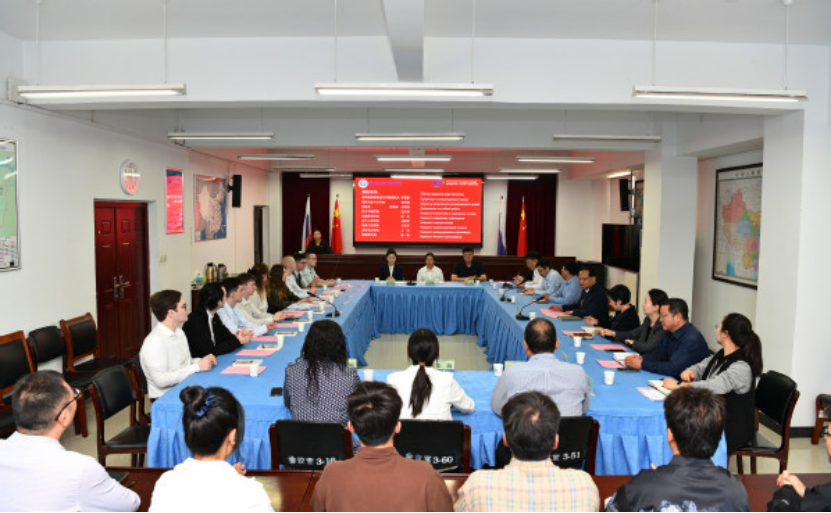The opening ceremony for the 'Chinese + Vocational Skills' program for international students was held by the college on 2024
Date: 2024-05-08 Author: Text/Qiao Cong Wang Xiaojing Photo/Zhang Yan Audit: Wang Wei Xing Huayan Editor: Zhang Yan
The college's opening ceremony for the 'Chinese + Vocational Skills' program for 2024 took place on the morning of May 8th. The event was attended by Vice President Li Fusheng, the heads of the Academic Affairs Office, International Exchange and Cooperation Office, and other relevant teaching and student management units. The ceremony included the participation of international students from the Ural State University of Transport of Russia and representatives from the college's student body, and was presided over by the individual in charge of the Silk Road Academy.

Vice President Li Fusheng began the ceremony by extending a warm welcome to the international students on behalf of the college. In his speech, he detailed the college's development history and its significant accomplishments in international exchange and cooperation. He noted that the Russian students' arrival has not only diversified the campus's international environment but also presented a unique opportunity for the college's community to engage with the culture of the Ural State University of Transport. He expressed his hope that participants would value this educational opportunity, utilize the school's resources effectively, diligently pursue professional knowledge, and seek ongoing improvement.Li Fusheng further expressed his hope that the international students would actively immerse themselves in campus life, proactively engage in a variety of group activities, and foster cultural exchanges between Chinese and Russian faculty and students. He emphasized the importance of adhering to the school's rules and regulations, respecting diverse cultural practices, and collectively cultivating a harmonious and amicable learning atmosphere. He encouraged the students to act as cultural ambassadors, to share their educational and life experiences in China with a wider audience, thereby contributing to the construction of a bridge for Sino-Russian cultural exchange.
The individual responsible for the Academic Affairs Office announced the teaching arrangements and related requirements for the international students. They requested that teaching units meticulously plan and be fully prepared in terms of course design, materials, and the preparation of practical training sites. It was suggested that teachers refine their teaching methods and restructure the content to suit the students' actual circumstances, while also promoting Chinese culture. The international students were reminded to adhere to classroom discipline and comply with the teaching arrangements.
Representing the faculty, teachers from the School of Electrical Engineering stated that they would use post tasks as an entry point and base their teaching objectives on the knowledge, abilities, and qualities necessary for those tasks, employing an integrated theoretical and practical teaching approach. They expressed their hope that the international students would value the learning opportunities, actively participate in the classroom environment, and work on enhancing their practical skills.
The student representative from the School of International Education remarked that China and Russia, being friendly neighbors, have a long-standing history of cultural exchange. The representative emphasized that the younger generation of both countries carries the responsibility of perpetuating friendship and deepening mutual understanding, and should actively engage in exchange activities, using their youth to continue the narrative of friendship.
The representative of the international students from the Ural State University of Transport of Russia stated that the relationship between China and Russia is foundational to regional and global stability and serves as a model for harmonious and innovative cooperation among major nations. They described Zhengzhou Railway Vocational & Technical College as an institution of higher learning that elegantly merges modern technology with culture. The representative expressed the group's intention to coexist and learn with Chinese students, acting as a conduit that connects the distinct cultures and ideas of both countries.
Since 2016, the college has been engaged in cooperative education with the Ural State University of Transport of Russia. Throughout this initiative, the college has earnestly implemented the 'Three Integrations and Three Innovations' strategy, which focuses on the integration of educational philosophies, curriculum resources, and faculty collaboration, as well as innovations in teaching management, talent cultivation, and scientific research cooperation. The outcomes have been significant, with the quality of Sino-foreign cooperative education showing continuous enhancement. In November 2023, Party Committee Secretary Tian Daomin visited Russia with a delegation, leading to an agreement that allows third-year undergraduate students from the Ural State University of Transport, specializing in railway-related fields, to study at our institution to acquire advanced knowledge and practical skills in Chinese railway systems. This signifies a further deepening and integration of the partnership, with the college introducing a new paradigm of international education that effectively coordinates and synergizes efforts to excel in both attracting international talent and expanding global outreach.This marks the arrival of the inaugural group of 9 undergraduate students from the Ural State University of Transport, who are specialized in the fields of power supply, locomotive vehicles, and railway transportation. They have come to China with the goal of advancing their proficiency in the Chinese language, bolstering their practical skills in their respective professions, gaining a deeper understanding of the evolution of China's high-speed rail technology, and broadening their knowledge and appreciation of Chinese traditional culture.

